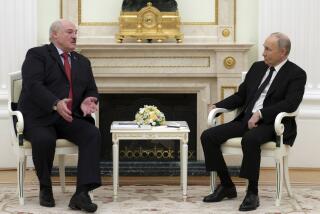Chechen War Drives Wedge Between Russia, Germany : Europe: Moscow defense chief unlikely to be invited to Munich meeting after criticizing opponents of fighting.
- Share via
MOSCOW — German Defense Minister Volker Ruehe has withdrawn an invitation for his Moscow counterpart to visit Germany in February after the Russian insulted leading critics of the war in Chechnya, the Itar-Tass news agency reported Sunday.
It was the sharpest diplomatic rebuke of Russia over the war to date and threw into question German-Russian military cooperation on European security issues for the immediate future.
Russian Defense Minister Pavel S. Grachev has been under intense criticism, accused of lying about Russian covert military meddling in Chechnya last fall and then of bungling the military operation aimed at crushing the republic’s 3-year-old bid for independence. He faces a likely no-confidence vote by the Russian Parliament next week, although only President Boris N. Yeltsin has the power to fire him.
On Friday, Grachev lashed out at two of Russia’s most trenchant war critics: Sergei A. Kovalev, Yeltsin’s estranged human rights commissioner, and Sergei N. Yushenkov, an army deputy colonel who heads the Defense Committee of the Duma, or lower house of Parliament.
“This sleazebag Yushenkov is slandering the army that gave him education and rank,” Grachev told a news conference at the Russian military base in Mozdok near Chechnya on Friday. “This sleazebag defends the scoundrels who want to demolish the country.”
Grachev also called Kovalev, a former Soviet political prisoner who is seen by many as Russia’s conscience, an “enemy of Russia” and a “traitor.”
In an interview in today’s editions of the German newspaper Bild-Zeitung, Ruehe described Grachev’s remarks as “unacceptable slander,” Itar-Tass reported.
“Minister Grachev must understand that such outbursts endanger the reform process in Russia and the West’s partnership with it,” Ruehe reportedly said. “I do not expect the Russian defense minister to come to Germany as had originally been planned in connection with the European Security Forum,” to be held next month in Munich.
Ruehe’s statements were especially sharp coming after a week during which German officials, like U.S. leaders, were careful to balance their concerns about civilian casualties in Chechnya with reassurances that the West continues to view the 6-week-old war as an internal Russian affair.
German Chancellor Helmut Kohl spoke with Yeltsin by phone Friday and reinforced his friendship with the Russian leader.
And the German Parliament adopted a resolution saying Russia has violated U.N. covenants on human rights and various European security agreements, but explicitly stating that “Germany intends to remain Russia’s partner and friend.”
By Sunday, however, the German position had apparently hardened slightly. Foreign Minister Klaus Kinkel, after meeting with Russian Foreign Minister Andrei V. Kozyrev in Bern, the Swiss capital, said that “the bloodshed in Chechnya must stop immediately.”
Also Sunday, Pope John Paul II said the international community is following events in Chechnya with “fear and apprehension.” Back at the Vatican after his Asian tour, the Pope called for a negotiated settlement of the conflict and appealed to Roman Catholics to aid the suffering people of Chechnya.
In the Chechen capital, Grozny, low-level battles continued Sunday, with Russian forces reportedly in control of roughly half the city and Chechen fighters stubbornly clinging to the other half.
Chechen snipers had reportedly re-entered the blackened skeleton of the presidential palace, which the Russians captured with great fanfare Thursday.
In Moscow, the largest demonstration against the war so far drew about 2,000 people to commemorate those killed in Chechnya. Among the organizers were Kovalev, Yushenkov and Yeltsin’s former economic guru, Yegor T. Gaidar.
More to Read
Sign up for Essential California
The most important California stories and recommendations in your inbox every morning.
You may occasionally receive promotional content from the Los Angeles Times.













